Text
Hi, everyone! Michelle here.
We've gotten some messages from some folks who are interested in helping out, but no one able to do the one thing we really need the most help with: EDITING.
If anyone out there knows anything about audio editing -or knows someone who does- and is willing to help us out, send us a message!! Thanks, everyone!!
Help Wanted
Hey everyone!
We're looking to take on an extra pair of hands behind the scenes for the podcast!
In particular, we'd love someone who would be comfortable taking on editing the episodes down from the full clips we record and making them the streamline versions you guys get to listen to.
Other admin roles may include things like:
Promoting the podcast on your own blog
Talking to potential guest hosts/speakers about their episodes for the podcast
Helping to type up episode notes for recording and later posting, this might also include research depending on the episode topic
Helping to make sure the episodes are uploaded on time and correctly
Helping to manage our tumblr blog (answering asks, checking the forms we provide for new submissions etc)
Being active in our discord channel (only used for admins and guests)
Featuring on the podcast itself isn't a requirement
The three of us are all busy gals, and if we're not able to find someone else to help out, we may have to put the podcast on hiatus as my (Bee's) son no longer naps in the day which used to give me 14-21 hours a week extra time for these things. We really don't want to have to hit pause on this podcast because we know how helpful it is to some of you, and we love providing you with this support.
If anyone can help, please either message @negans-lucille-tblr @mrswhozeewhatsis or @writethelifeyouwant privately or you can send an ask to this blog.
Thank you and a Happy New Year! <3
Bee, Michelle and Mads x
39 notes
·
View notes
Text
Deep Dive: Underage Sex in Fics
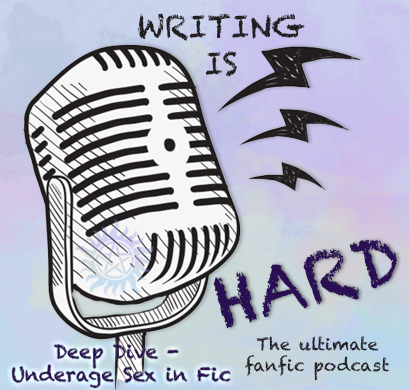
Listen to the episode here
Summary: Bee and Mads get down and dirty talking about underage kids getting down and dirty.
Speakers: Bee (@negans-lucille-tblr) and Mads (@writethelifeyouwant)
Run time: 38:15
Tags/Warnings: Discussion of underage sex and sexual acts
Disclaimer: We are not legal professionals and the law changes across states and countries, so you will need to do your own research for your own location or ask a professional in your area.

(image credit)
Episodes Masterlist
A rundown of some of the points discussed is below the cut!
The Legal Stuff (as we understand it):
Obscenity laws (of which child pornography laws are a subset) across the board seem to specify images, not literature. Because of this lack of specificity, the legalities around the written word are a huge grey area (at least in the US and the UK, as that’s where we’re all based). At any time, someone could decide to test the legal waters around underage erotica, so all writers need to be aware of this risk. Do the research on the laws in your part of the world before publishing anything that could fall under this umbrella. [Editor’s Note: Obscenity laws, in general, seem to leave a lot of leeway to courts and current morality, except in cases of child pornography. What exactly would be considered child pornography in literature—as in what age is considered the age of consent for a fictional character, what acts would be considered sexual, and other such logistical details—is not specified. For example, a case could be made that a story depicting two thirteen-year-olds engaged in heavy petting could be considered child pornography, even if no clothing is removed. These kinds of details won’t be known until a case goes to court and is adjudicated.]
Another reason why knowing your local child pornography laws is so important when writing fanfiction is because of the legal risks surrounding all fanfiction. For example, if you’re writing Spiderman fanfiction where he’s still in high school, and Disney decides they don’t like your writing, they will look for any and all statutes that could possibly apply. If fair use fails, they could move on to obscenity.
Outside of just writing and posting your story, another possible legal snag that we can see involves users on Tumblr tagging other users. When Tumblr sends an email to the tagged user, the entire story is included in the email. In the case of underage smut, the argument could be made that this is the distribution of child pornography. (Emailing an image of child pornography like this is definitely considered distribution, hence our mentioning this here.) AO3 only sends a link to the story with a summary, so we feel that would not qualify as distribution.
Again, laws differ around the world, and this area of law is not well-defined in most places. Check your local laws and decide for yourself what you feel comfortable publishing and how. At any time, someone could decide to test these laws in court, at which time everything could change, with your writing as the example they use.
Difference between erotica and just sex.
Erotica is detailed, descriptive, and basically a form of pornography. It is written with the intention of arousing the reader.
Less detailed sex scenes, written without the intention of arousing the reader, are not considered erotica.
Factors that readers may consider when deciding if a story is morally right or wrong:
Realism - In the real world, teenagers have all kinds of sexual activity.
Necessity to the story - Would the story be changed significantly without the sex or if the characters having sex were both over the age of consent?
Mental maturity of the characters - For example, in Supernatural, Jack is technically only a baby, but he is a fully-formed adult with adult levels of comprehension. This could go both ways, with characters over the age of consent not being mature enough to understand the concept of consent.
The age of the actor playing the character in your story - Most actors playing teenagers on TV and in movies are over the age of consent, but this is not always the case. Be aware of the age of the actors involved when writing your story.
Age gap between characters - Teenagers in school together are more common than older adults with teenagers.
Historical accuracy - Consent laws have changed over the centuries and from country to country around the world.
Other-worldly customs - In fantasy worlds, customs and social morals are different, so actions that would be illegal or immoral in our world are accepted.
Level of detail - The more detail about the acts, the more objectionable some readers may find the story. Mentioning a character lost their virginity at 15 is much less inflammatory than outright describing the acts that caused the character to lose their virginity.
This topic was so interesting, we decided to cut it into two episodes! In the next episode, we will discuss underage sex in mainstream media and how it’s handled!
Have some feedback or questions about what we talked about? Send us an ask and let us know!

We are looking for someone to help with the editing of the podcast and some other admin duties! If you are interested in helping out on a regular basis, please send us an ask, or send a message to any of our admins, @negans-lucille-tblr, @writethelifeyouwant, and @mrswhozeewhatsis!
#writing is hard podcast#writingishardpodcast#podcast#writing podcast#fanfic advice#episodes#deep dive#underage sex in fics#fanfic#fanfiction#fan fic#fanfic podcast#tbd /#writethelifeyouwant#negans lucille tblr
16 notes
·
View notes
Text
Deep Dive: Underage Sex in Fics

Listen to the episode here
Summary: Bee and Mads get down and dirty talking about underage kids getting down and dirty.
Speakers: Bee (@negans-lucille-tblr) and Mads (@writethelifeyouwant)
Run time: 38:15
Tags/Warnings: Discussion of underage sex and sexual acts
Disclaimer: We are not legal professionals and the law changes across states and countries, so you will need to do your own research for your own location or ask a professional in your area.

(image credit)
Episodes Masterlist
A rundown of some of the points discussed is below the cut!
The Legal Stuff (as we understand it):
Obscenity laws (of which child pornography laws are a subset) across the board seem to specify images, not literature. Because of this lack of specificity, the legalities around the written word are a huge grey area (at least in the US and the UK, as that’s where we’re all based). At any time, someone could decide to test the legal waters around underage erotica, so all writers need to be aware of this risk. Do the research on the laws in your part of the world before publishing anything that could fall under this umbrella. [Editor’s Note: Obscenity laws, in general, seem to leave a lot of leeway to courts and current morality, except in cases of child pornography. What exactly would be considered child pornography in literature—as in what age is considered the age of consent for a fictional character, what acts would be considered sexual, and other such logistical details—is not specified. For example, a case could be made that a story depicting two thirteen-year-olds engaged in heavy petting could be considered child pornography, even if no clothing is removed. These kinds of details won’t be known until a case goes to court and is adjudicated.]
Another reason why knowing your local child pornography laws is so important when writing fanfiction is because of the legal risks surrounding all fanfiction. For example, if you’re writing Spiderman fanfiction where he’s still in high school, and Disney decides they don’t like your writing, they will look for any and all statutes that could possibly apply. If fair use fails, they could move on to obscenity.
Outside of just writing and posting your story, another possible legal snag that we can see involves users on Tumblr tagging other users. When Tumblr sends an email to the tagged user, the entire story is included in the email. In the case of underage smut, the argument could be made that this is the distribution of child pornography. (Emailing an image of child pornography like this is definitely considered distribution, hence our mentioning this here.) AO3 only sends a link to the story with a summary, so we feel that would not qualify as distribution.
Again, laws differ around the world, and this area of law is not well-defined in most places. Check your local laws and decide for yourself what you feel comfortable publishing and how. At any time, someone could decide to test these laws in court, at which time everything could change, with your writing as the example they use.
Difference between erotica and just sex.
Erotica is detailed, descriptive, and basically a form of pornography. It is written with the intention of arousing the reader.
Less detailed sex scenes, written without the intention of arousing the reader, are not considered erotica.
Factors that readers may consider when deciding if a story is morally right or wrong:
Realism - In the real world, teenagers have all kinds of sexual activity.
Necessity to the story - Would the story be changed significantly without the sex or if the characters having sex were both over the age of consent?
Mental maturity of the characters - For example, in Supernatural, Jack is technically only a baby, but he is a fully-formed adult with adult levels of comprehension. This could go both ways, with characters over the age of consent not being mature enough to understand the concept of consent.
The age of the actor playing the character in your story - Most actors playing teenagers on TV and in movies are over the age of consent, but this is not always the case. Be aware of the age of the actors involved when writing your story.
Age gap between characters - Teenagers in school together are more common than older adults with teenagers.
Historical accuracy - Consent laws have changed over the centuries and from country to country around the world.
Other-worldly customs - In fantasy worlds, customs and social morals are different, so actions that would be illegal or immoral in our world are accepted.
Level of detail - The more detail about the acts, the more objectionable some readers may find the story. Mentioning a character lost their virginity at 15 is much less inflammatory than outright describing the acts that caused the character to lose their virginity.
This topic was so interesting, we decided to cut it into two episodes! In the next episode, we will discuss underage sex in mainstream media and how it’s handled!
Have some feedback or questions about what we talked about? Send us an ask and let us know!

We are looking for someone to help with the editing of the podcast and some other admin duties! If you are interested in helping out on a regular basis, please send us an ask, or send a message to any of our admins, @negans-lucille-tblr, @writethelifeyouwant, and @mrswhozeewhatsis!
#writing is hard podcast#writingishardpodcast#podcast#writing podcast#episodes#deep dive#underage sex in fics#fanfic advice#fanfiction#fan fic#fanfic#fanfic podcast#writethelifeyouwant#negans lucille tblr
16 notes
·
View notes
Text
Help Wanted
Hey everyone!
We're looking to take on an extra pair of hands behind the scenes for the podcast!
In particular, we'd love someone who would be comfortable taking on editing the episodes down from the full clips we record and making them the streamline versions you guys get to listen to.
Other admin roles may include things like:
Promoting the podcast on your own blog
Talking to potential guest hosts/speakers about their episodes for the podcast
Helping to type up episode notes for recording and later posting, this might also include research depending on the episode topic
Helping to make sure the episodes are uploaded on time and correctly
Helping to manage our tumblr blog (answering asks, checking the forms we provide for new submissions etc)
Being active in our discord channel (only used for admins and guests)
Featuring on the podcast itself isn't a requirement
The three of us are all busy gals, and if we're not able to find someone else to help out, we may have to put the podcast on hiatus as my (Bee's) son no longer naps in the day which used to give me 14-21 hours a week extra time for these things. We really don't want to have to hit pause on this podcast because we know how helpful it is to some of you, and we love providing you with this support.
If anyone can help, please either message @negans-lucille-tblr @mrswhozeewhatsis or @writethelifeyouwant privately or you can send an ask to this blog.
Thank you and a Happy New Year! <3
Bee, Michelle and Mads x
39 notes
·
View notes
Text
Deep Dive: Dark Fics and Trauma
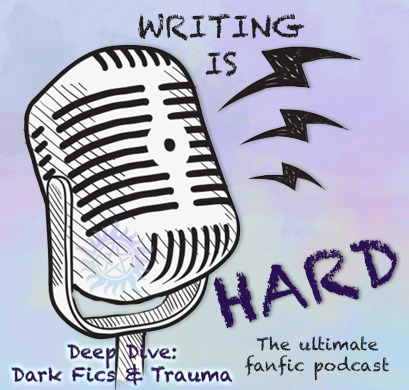
Listen to the episode here
Summary: Continuation from the previous episode about writing dark stories, with a focus on trauma in both writers and readers.
Speakers: Bee (@negans-lucille-tblr) and Mads (@writethelifeyouwant)
Run time: 16:57
Tags/Warnings: Discussion of trauma, such as rape, sexual assault, and domestic abuse.

Episodes Masterlist
A rundown of some of the points discussed is below the cut!
Some writers who write dark stories have experienced trauma and use their writing as a way to work through it. Other writers have not, but are interested in exploring a subject. For those writers not writing from experience, our advice is to do the research and be respectful of those who have experienced it. Even if you have experienced trauma, not everyone experiences it the same way, so some research is always a good idea.
Whether you have experienced trauma or not, you have the right to write your stories. No one has the right to tell you that you can’t write what you want to write. The same applies for readers. Reading it can be therapeutic and you don’t owe anyone any explanations about it.
No matter what side of it you are on, writing or reading this does not make you a bad person. You are completely normal. If Eric Kripke can be applauded for half the stuff he writes for The Boys, the rest of us are just fine.
Next episode: Underage sex in fiction. Legalities, boundaries, and what people will and will not tolerate.
That’s all this episode! Let us know what you think!
#writing is hard podcast#writingishardpodcast#podcast#writing podcast#episodes#deep dive#dark fics and trauma#fanfic advice#fanfiction#fan fic#fanfic#negans lucille tblr#writethelifeyouwant
16 notes
·
View notes
Text
Introduction to Dark Fics
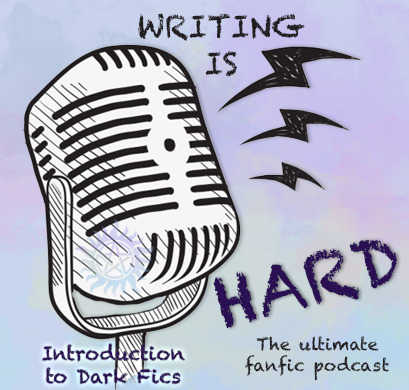
Listen to the episode here
Summary: Bee and Mads give a brief introduction into dark fics, including taboo subjects and grey areas.
Speakers: Bee (@negans-lucille-tblr) and Mads (@writethelifeyouwant)
Run time: 40:19
Tags/Warnings: Mentions of: non con, dub con, coercion, torture, heavy violence/gore, incest, self harm, abuse (all forms), murder, character death, suicide, drug use, underage sex/smut

Episodes Masterlist
A rundown of some of the points discussed is below the cut!
What constitutes as dark? Here we discuss all topics that would be considered dark.
Grey areas - These are topics that might not be "dark" but could still be taboo or triggering depending on the severity and situation.
How to Approach Writing Dark Fic
Warn and tag accordingly. It’s super important to make sure that people are aware before going into it what they’re getting into. This includes using hashtags so people can blacklist content they don’t want to see. We talk about the two blocking features on tumblr that people can use for this kind of content. Blocking tags and filtering content can both be used.
Be prepared for backlash. Unfortunately it happens. Always be respectful of others even if they’re not respectful towards you. If you can't handle this, consider turning off the anon feature in your ask box, this often helps.
Be reassured that you are not a bad person for wanting to write or read dark fictions. Whether you have trauma or experience or not.
There is a lot of mainstream media that deals with a manner of dark topics that are extremely popular. Fiction shouldn't be treated any differently to those.
Separate fiction from reality - it is extra important you are mindful of minors reading your fics if they are dark because younger audiences sometimes aren’t mature enough to do this.
Let us know if there's anything dark fic related you want us to do an episode on, send us your thoughts and questions here!
Thanks for listening!
#introduction to dark fics#writingishardpodcast#writing is hard podcast#negans-lucille-tblr#writethelifeyouwant#episodes#podcast#fanfic#fanfic podcast#fanfic advice#tw: non con#tw: dub con#tw: dark content#tw: violence#tw: drugs
21 notes
·
View notes
Text
Introduction to Dark Fics

Listen to the episode here
Summary: Bee and Mads give a brief introduction into dark fics, including taboo subjects and grey areas.
Speakers: Bee (@negans-lucille-tblr) and Mads (@writethelifeyouwant)
Run time: 40:19
Tags/Warnings: Mentions of: non con, dub con, coercion, torture, heavy violence/gore, incest, self harm, abuse (all forms), murder, character death, suicide, drug use, underage sex/smut

Episodes Masterlist
A rundown of some of the points discussed is below the cut!
What constitutes as dark? Here we discuss all topics that would be considered dark.
Grey areas - These are topics that might not be "dark" but could still be taboo or triggering depending on the severity and situation.
How to Approach Writing Dark Fic
Warn and tag accordingly. It’s super important to make sure that people are aware before going into it what they’re getting into. This includes using hashtags so people can blacklist content they don’t want to see. We talk about the two blocking features on tumblr that people can use for this kind of content. Blocking tags and filtering content can both be used.
Be prepared for backlash. Unfortunately it happens. Always be respectful of others even if they’re not respectful towards you. If you can't handle this, consider turning off the anon feature in your ask box, this often helps.
Be reassured that you are not a bad person for wanting to write or read dark fictions. Whether you have trauma or experience or not.
There is a lot of mainstream media that deals with a manner of dark topics that are extremely popular. Fiction shouldn't be treated any differently to those.
Separate fiction from reality - it is extra important you are mindful of minors reading your fics if they are dark because younger audiences sometimes aren’t mature enough to do this.
Let us know if there's anything dark fic related you want us to do an episode on, send us your thoughts and questions here!
Thanks for listening!
#introduction to dark fics#writingishardpodcast#writing is hard podcast#negans-lucille-tblr#writethelifeyouwant#episodes#podcast#fanfic#fanfic podcast#fanfic advice#tw: non con#tw: dub con#tw: violence#tw: drugs#tw: dark content
21 notes
·
View notes
Text
How To: Fic Plan and Brainstorm
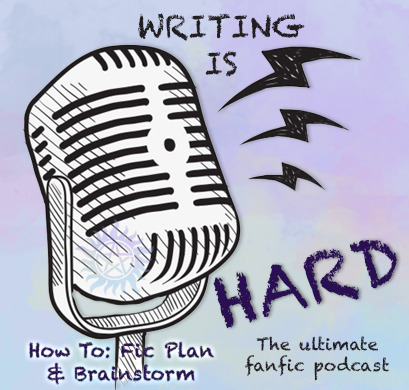
Listen to the episode here.
Summary: Bee and Alex talk about brainstorming and planning your story from beginning to end.
Speakers: Bee (@negans-lucille-tblr) and Alex (@hoboal87)
Run time: 34:09
Tags/Warnings: Spoilers for stories mentioned during the discussion!
Fic feature: @50shadesofcockles - Destiel drabble
Big thanks to @katbratsupernaturalwhore who edited the audio for this episode!
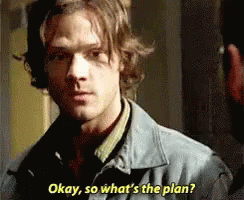
(x)
Episodes Masterlist
A rundown of some of the points discussed is below the cut!
Brainstorming:
Different writers brainstorm in different ways. Some writers just talk at someone and that helps loosen whatever is stuck. Other writers need someone who can respond and provide input.
Brainstorming can make you think about your character and whether they will really do/say the thing you want them to do/say.
Sometimes you can even brianstorm with yourself by just writing things down as if you were talking to someone else.
Planning vs Not Planning:
Most writers who don’t plan much (sometimes called ‘pantsers’) have more character-driven stories. Writers who plan more tend to have more plot-driven stories.
Even if you plan a story strictly, you don’t need to strictly stick to the plan. It’s okay to let the story go a different way. (Being a ‘plantser’ is totally valid!)
Types of Plans:
The most basic kind of plan for a story would probably be a list of bullet points of what needs to happen in the story like plot twists, character deaths, etc. Sometimes it can be dialogue bits. Sometimes a plan is just a destination and you let the characters find their own way to the end.
Some writers will sit down and write out extensive backstories for their characters before they start writing the story. This is also a kind of story planning.
Times when a plan is more necessary:
When there are a number of different storylines that need to converge
Stories with time travel
Round robin style stories where multiple writers each write a chapter
Canon-based fanfic stories
That's all this episode! Let us know what you think!
#writing is hard podcast#writingishardpodcast#podcast#writing podcast#episodes#how to#fic plan and brainstorm#fanfic advice#fanfiction#fan fic#fanfic#negans lucille tblr#hoboal87
37 notes
·
View notes
Text
Deep Dive: Reader Insert vs. Original Character

Listen to the episode here.
Summary: Deep dive into the pros and cons of making your story a reader insert or creating an original character.
Speakers: Bee (@negans-lucille-tblr) and Mads (@writethelifeyouwant)
Run time: 38:08
Tags/Warnings: None this time!
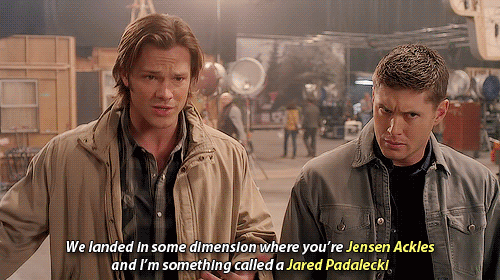
Episodes Masterlist
Note: We’re starting a new thing we’d like to do every episode where we feature a story nominated by you, our listeners! To nominate your own/favorite story, click here to fill out the form and tell us all about it!
A rundown of some of the points discussed is below the cut!
Reader Insert stories can be difficult because of the need for the main character to be generic, but not so generic as to ruin the story. How generic a reader insert story should be is a very subjective opinion and there is no objective standard to be measured against. Everyone has their own opinions and that’s okay.
Removing all character details, including Y/N’s emotions and reactions, can highlight what’s happening with the other characters, but will make for a bland storyline if Y/N needs to be involved in the action. Y/N would only be an observer.
There is a line each writer needs to draw for each story dictating what traits Y/N does and does not need in order for that particular story to work. This line is wholly dependent on the storyline. The writer needs to consider each character trait to determine if they are needed for the story or not. If they are not, they can be left out, and that makes the character more reader-insertable.
Certain details about the Y/N character should be put in the author’s note so that the audience is warned, just in case the reader objects to it. [Editor’s Note: Think of this like warning tags for squicks.] Race, age, physical size, and gender are the traits most commonly listed when they are specified in a reader insert story. Writing a story to cater to a certain audience by specifying traits like this is definitely okay, and even welcomed by many, as long as you list the traits involved in the author’s note.
The details usually left out of a reader insert are about the reader’s appearance and age. Unless the story depends on Y/N being a certain age or a POC, these details are the easiest to remove from a story without affecting the plot. For the sake of representation, though, writing a story with a POC Y/N character is always appreciated! [Editor’s Note: POC have a different experience of the world and stories that highlight this are not seen enough in reader insert writing!]
Gender is usually assumed to be female in reader inserts, but there are male readers out there, too. Some writers specifically write for male or gender-neutral readers. More writers are learning that their story is not dependent on Y/N’s gender and are working hard to craft those stories in a way that is more inclusive. [Editor’s note: Make this a challenge for yourself, and expand your audience all at the same time!]
There is a point where a writer can use too few details. For example, if your Y/N character gets dirty, that’s okay to say. It’s a universal experience and not a detail that would exclude any part of your audience.
If there is a detail that you feel, as a writer, should not be in a reader insert story, but leaving it out compromises your story, you should definitely consider just making your Y/N an original character. If the story is boring from lack of detail, then it won’t matter if your Y/N character is reader-insertable or not, the audience will not want to be inserted in the story. Change it to an OC. The story will be better and your audience will appreciate it!
Although common, using acronyms like Y/E/C or Y/H/C can take readers out of the story. Which sounds better, “Dean loved Y/N’s Y/E/C eyes,” or, “Dean loved the color of her eyes.” [Editor’s Note: There are also a million other ways to describe eyes than by color. They can shine, they can sparkle, they can be knowing or angry. Even when avoiding length or curliness, hair can be shiny or soft.] Using these abbreviations can get excessive, like Y/H/T for Your Home Town, or Y/B/F/N for Your Best Friend’s Name. This is when you should certainly decide if these details are necessary, and if they are, just name them and move on. Yes, you may lose a reader or two, but your story will be better.
Whenever you stipulate a detail, you will alienate some readers. This is okay. Not every story is for everyone and that’s okay. Just like some readers don’t want to read smut, some readers don’t want to read a story where Y/N is 18, and that’s okay. If Y/N being 18 is necessary for your story, write your story. There will still be plenty of readers who are okay with it.
Write what makes you happy and makes your story better and the audience that likes that will come. Everyone is different, both writers and readers, we all have different preferences, and it’s all okay. No matter how you write your story, whether it’s a very generic reader insert or a specific original character or somewhere in the middle, there will be an audience out there to appreciate it. If someone doesn’t like the way you’ve written your story, there are plenty of other stories out there that they will like better, and that’s okay.
That’s it for this episode! Give it a listen and let us know what you think!
#writing is hard podcast#writingishardpodcast#podcast#fanfic podcast#episodes#deep dive#reader insert vs original character#fanfic advice#fanfiction#fan fic#fanfic#negans lucille tblr#writethelifeyouwant
10 notes
·
View notes
Text
COMING SOON - How to: Brainstorm and Fic Plan
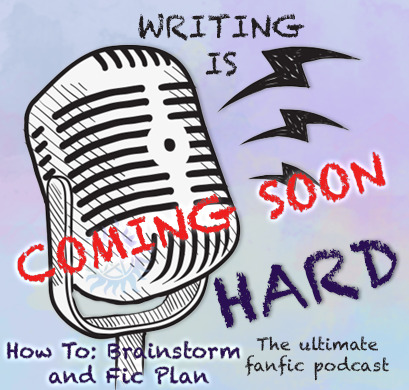
On Friday, Bee (@negans-lucille-tblr) and Mads (@writethelifeyouwant) are going to be talking to the gorgeous @hoboal87 about how to brainstorm and plan your fiction.
Send us an ask to let us know if you have any questions you'd like us to address, or tips that you'd like to share 🥰🥰
#writingishardpodcast#coming soon#writeblr#asks open#writing help#upcoming#how to brainstorm#how to fic plan
11 notes
·
View notes
Text
The Basics: Reader Insert vs. Original Character
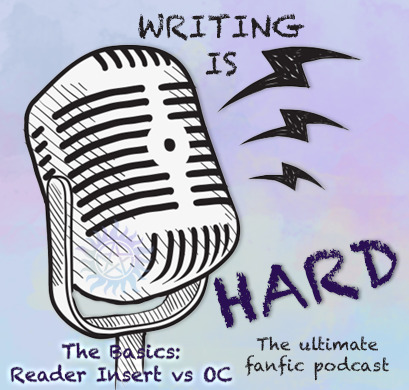
Listen to the episode here.
Summary: Discussing the pros and cons of making your story a reader insert or creating an original character
Speakers: Bee (@negans-lucille-tblr) & Mads (@writethelifeyouwant)
Run time: 40:27
Tags/Warnings: Bee talks herself into reading even more fanfiction.
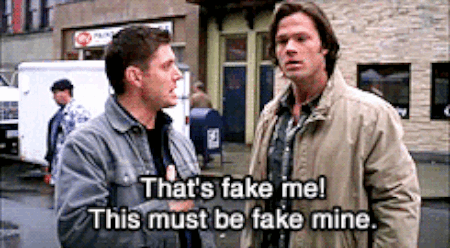
(x)
Episodes Masterlist
Note: We're starting a new thing we'd like to do every episode where we feature a story nominated by you, our listeners! To nominate your own/favorite story, click here to fill out the form and tell us all about it!
A rundown of some of the points discussed is below the cut! (And a POLL! Let us know what you think!)
Reader insert (RI) refers to stories written where the main character has few or no identifying qualities, generally using ‘Y/N’ as the character’s name, allowing the reader to insert themselves into the story. Original Character (OC) refers to stories where the main character is created by the writer with a name and specific characteristics.
Making your story OC:
Part of the challenge of OC is making that OC relatable to your audience. If your OC is not relatable, no one will get invested in the story.
OC can be freeing creatively because then you don’t need to regulate certain parts of your story simply to keep a character generic.
Making your story RI:
Reader insert is actually very hard, because of audience diversity. There will be readers from different cultures with different physical characteristics, and it’s impossible to have a truly generic character and still have an interesting story. There needs to be a balance, which unfortunately, will always alienate a portion of your audience. It’s impossible to cater to every single reader.
You can make an RI character that has some traits essential to the story. A warning in the tags of the story is usually enough to satisfy readers that, for instance, this Y/N in this story is a specific age or ethnicity.
RI gives the reader a familiarity with this ‘new’ character of Y/N, the same way fan fiction gives the reader familiarity with the world in which the story is written. We already know details of the world and its characters, so there are no mental gymnastics to be done. We already know things about ourselves, so a very generic reader insert character is automatically familiar.
There is a line when writing RI that you need to decide what details need to be included. This line will be talked about more in detail in a future episode.
Deciding on whether your story should be RI or OC:
Why are you writing? If for yourself, then do what you want. (Obviously, writing a request or commissioned story would be different as you would need to follow the prompts given.)
OC gives you greater creative freedom.
RI seems to be more popular, probably because it lets the reader insert themselves more easily into the story. Especially in fanfiction, readers want to see themselves with their favorite characters from the source material.
Some writers basically create an original character, but simply name them Y/N (which is the commonly used acronym for Your Name used in reader inserts). Other writers strive to make their Y/N character as generic as possible so they are relatable to a wider audience. Neither approach is wrong.
Don’t look at original characters as a bad thing, or think that completely generic reader insert characters are the pinnacle of writing. A lot of newer writers seem to be thinking this way.
Story integrity is more important than the popular tag you can put on the tumblr post to attract readers. Do what is most natural for you and you will gain an audience that likes what you write because your writing will be better. This will also prevent you from feeling like you will lose part of your audience later if you decide to switch from one to the other.
Consider your character and how they fit into the plot of the story. Are there certain things that need to be true because of the plot of the story? For example, if the OC is another character’s child, then there will be certain traits that will be expected in that OC. Turning this OC into a RI would lessen the effectiveness of the story.
If it’s PWP (Porn Without Plot), then RI is easier. Certain characters also tend to give people nicknames, so a RI is easier to write, and you can use those nicknames instead of Y/N.
How long is your story? One-shots and drabbles are easier to make RI. Longer stories tend to require an OC more often.
What POV are you writing from? Writing from Y/N’s POV makes it easier to be RI over OC.
People don’t use names as frequently in real life as characters do in stories. You can get away with just not using a name. (In a similar vein, how many times do you really notice someone’s physical traits in everyday life? Unless you’re gazing into their eyes, how important is someone’s eye color in everyday life?)
Fun exercise: create different characters and figure out if swapping out those characters changes the story significantly. If not, then that story would be good as a RI. If it would, then it would probably be better as an OC story.
There’s no right or wrong answer. Write what fits your story and makes you feel most comfortable.
Poll:
Which do you prefer? Reader insert or original character? A mix of both? Y/N with some specific traits? Do you read both? Do you actually insert yourself into a story or read a story like watching a movie?
Have you read some OC stories you love? Reblog with links so we can all read them!
That's it for this episode! Give it a listen and let us know what you think!
#writing is hard podcast#writingishardpodcast#podcast#fanfic podcast#episodes#the basics#reader insert vs original character#fanfic advice#fanfiction#fan fic#fanfic#fan fiction#negans lucille tblr#writethelifeyouwant
32 notes
·
View notes
Note
your last podcast episode; something everyone needs to hear. You two ladies brought up lots of good points, and if I close my eyes, it's like I'm in the same room. Your voice is super soothing too Bee !! Miss ya a lot luv !!!
Thank you so much, beautiful 🥰
Aww you're too kind! I think I sound like a man most of the time 🤣
So glad you enjoyed listening to me and @thinkinghardhardlythinking ramble away! ❤️
@writingishardpodcast
6 notes
·
View notes
Text
How To: Deal with Criticism & Hate

Listen to the episode here.
Summary: Bee and Saira discuss how to deal with all kinds of criticism, including hate.
Speakers: Bee (@negans-lucille-tblr) and Saira (@thinkinghardhardlythinking)
Run time: 34:35
Tags/Warnings: Discussion of hateful messages. The accents make them sound lovely, though!
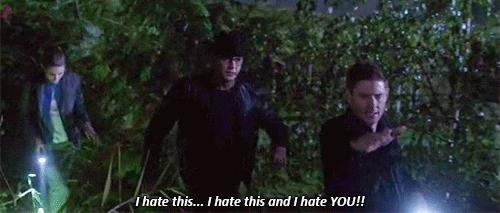
(x)
Episodes Masterlist
A rundown of some of the points discussed is below the cut!
No matter how constructive or polite criticism is given, it will always hurt. These are some ways to deal with it.
To respond or not to respond to constructive criticism:
If unsolicited, you can ignore it if you want to. Delete the ask or whatever and move on. You are under no obligation to listen to or answer comments you have not asked for.
Determine if the criticism is constructive and well-meant or simply hateful and intended to hurt you. Take a moment, let it sink in, get past the initial hurt, and then re-evaluate the comments and the commenter before deciding whether to respond. Knee-jerk reactions are never good.
If the comments are hateful, you do not need to let them live in your head rent-free. If you decide to respond, however, try to treat them with the kindness and respect you wish they would have used with you.
To accept or reject constructive criticism given to you:
Do they have a valid point? Considering criticism, even if unsolicited, can be constructive and can help you become a better writer.
If you disagree with their criticism, make sure you have a well-considered reason why. Doing this helps you to not reject good criticism out of hand and make a mindful decision that will improve your writing.
Do you respect the person providing the criticism? Only take criticism from people you want to emulate.
Don’t lose your voice because of bending to everyone’s criticism. In the end, you are the writer and only you can bring yourself to your writing. Also, we’re doing this for free, for the joy of it, so don’t lose the joy.
Dealing with outright hate:
When you receive outright hate, just delete it. Yes, it hurts, and it will bother you, but don’t give them the attention they crave. A certain type of person sends hate, and they are not interested in making you a better writer.
Take a break, talk to your friends, touch grass, and be kind to yourself. You are the better person for walking away rather than engaging them. If you really want to respond, make sure you’re doing it for the right reasons. As mentioned above, if you decide to respond, treat them better than they treated you.
People who send hate are attention-seeking, so starving them of that attention is the best way to respond. The more you answer them and defend yourself, the more they will attack because they enjoy the drama they create. Protect yourself and others by just deleting it.
That’s it for this episode! Give it a listen and let us know what you think!
#writing is hard podcast#writingishardpodcast#podcast#how to#episodes#deal with criticism and hate#fanfic podcast#fanfic advice#fanfiction#fan fic#fanfic#negans lucille tblr#thinkinghardhardlythinking
28 notes
·
View notes
Text
Deep Dive: Constructive Criticism vs. Criticism and How To Give It

Listen to the episode here.
Summary: Bee and Saira discuss constructive criticism and tips for giving it to other writers.
Speakers: Bee (@negans-lucille-tblr) and Saira (@thinkinghardhardlythinking)
Run time: 32:58
Tags/Warnings: They both have accents, so if you have an accent kink like a certain actor we all know, strap yourself in! *wink*
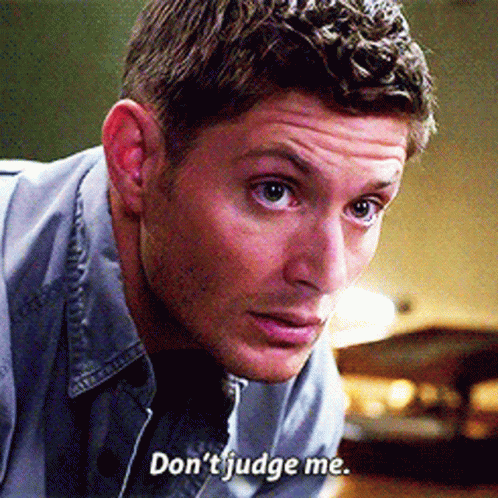
(x)
Episodes Masterlist
A rundown of some of the points discussed is below the cut!
Difference between criticism and constructive criticism:
Criticism: Usually focuses on the negative, is sometimes just personal opinions, with no suggestions for improvement.
Constructive criticism: A positive, helpful, empowering tool to help an artist better their work.
General etiquette for giving feedback:
Only give critical feedback if it’s requested. Unsolicited critical feedback is never appreciated, no matter how well-meant.
If you really want to be helpful, ask the writer if they are open to receiving it from you before giving it.
Be polite and respectful.
Make sure you point out positive points, not just the negative. [Editor’s note: Some writers and editors call this a ‘sh*t sandwich’. Put a negative in between two positives.]
Be kind. A little gentleness can go a long way when pointing out mistakes.
Make suggestions for improvements, don’t just rewrite what they wrote.
When beta reading, understand that the writer doesn’t have to agree with your every opinion. It’s their story and they have veto power. It has to sound like their writing, not yours.
Be careful with the wording of your suggestions. Tone doesn’t always translate via text.
That's it for this episode! Give it a listen and let us know what you think! Also, stay tuned for an episode about the other side of this coin, receiving criticism!
#writing is hard podcast#writingishardpodcast#podcast#deep dive#episodes#criticism vs constructive criticism#fanfic podcast#fanfic advice#fanfiction#fan fic#fanfic#negans lucille tblr#thinkinghardhardlythinking
12 notes
·
View notes
Text
The Beginners Guide: Posting on Tumblr
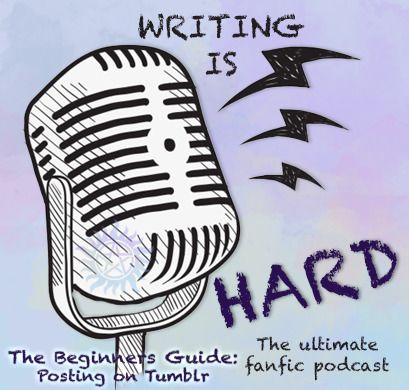
Listen to the episode here.
Summary: Bee and Mads discuss the basic rules and guidelines for posting your story on Tumblr.
Speakers: Bee (@negans-lucille-tblr) and Mads (@writethelifeyouwant)
Run time: 32:58
Tags/Warnings: Mentions of things that you would normally put in your warning tags on a story.

(x) [Editor's Note: Sam's got it right. It's just SO MUCH EASIER to post using desktop instead of the mobile app!]
Episodes Masterlist
A rundown of some of the points discussed is below the cut!
In this episode, Bee and Mads talk about what you need to include in your post when posting your works on Tumblr!
Different writing platforms that aren’t Tumblr:
AO3: Just for writing with some art. No blogging. Great for posting series. User friendly. Can grow an audience easily. Helps with plagiarism claims. Defends fanfic writers against lawsuits. Not allowed to mention Patreon, kofi, or other sites where profiting from fic is possible. Must be invited to create an account. Easy and quick to apply and get an invite.
Wattpad: Notorious for users stealing other writers’ works. They’re really bad at dealing with plagiarism complaints.
Fanfiction.net: Not allowed to have reader inserts.
Posting on Tumblr:
There is a new post editor currently in beta. It’s different, and takes time to learn, but has a lot of advantages.
Lots more options for font style, size, and color.
Can copy and paste from Google docs directly into the editor without losing formatting.
Mention tags do not need to be activated.
Can only tag 50 blogs per post.
A list of hashtags can be copied from Google and pasted directly into a post. (Old editor required a browser extension like xkit or tumblr tags.
Bugs: The editor sometimes gets overwhelmed and doesn’t allow you to type certain letters or otherwise freaks out. You can switch back to the old editor, and then update with the new editor. [Editor’s Note: Also, saving the post as a draft, then editing the draft will make it work again.] Tumblr is not great, but it's what we’ve got, so we deal with it.
Creating a post, from top to bottom:
Title: Some people use a collage of pictures as a banner with the title in it. [Editor’s Note: Putting the title of your work in the title area of a post makes it easier to find when someone looks at your archive.]
Rating (like how movies are rated): This is necessary, especially if your fic contains adult themes, gore, excessive violence, dark themes, etc.
Pairing: This is necessary. If there is no pairing, you can say “No Pairing” or list the characters included in the story.
Word count: This is necessary. Readers need to know if they have time to finish your story.
Warnings: This is necessary, especially if there are adult themes, gore, dark themes, non-con, dub-con, etc. Giving warnings is part of being responsible as a writer and helping readers avoid triggering content.
Summary: Most include one but some don’t. Mads will sometimes only include a summary on the masterlist for a series to keep chapter posts from getting too long. When posting on AO3, you need a summary, but for Tumblr, it’s not as necessary for every post.
Additional tags: These tags are not necessary like warnings tags. These can be teasing and hint at what happens in the story. [Editor’s note: This is where a writer may list included kinks to attract readers.] This can also replace a summary. You should have either a summary or this tag list.
Author’s Note: Not necessary. Here you would put anything you want to add before someone reads your story. Link to the series masterlist or your main masterlist. Mention any prompts, challenges, bingos, or requests related to the story. This is a good place to give credit to any alpha, beta, or omega readers who helped you with the story (after checking that they are okay being tagged)!
Credit to artists who create banners, dividers, gifs, or any art that you include.
Insert a gif, image, or divider
Your story goes here.
Use a Keep Reading tab for posts over 500 words, including the fic header. This is necessary! You can create suspense to a story by placing the cut in a certain place. It makes people want to read more.
Mention tags should be put at the bottom of the post. The new post editor makes adding these tags much easier.
Use the appropriate hashtags at the bottom of the post. These tags help people blacklist content that triggers them, and also help people find stories they want to read. #tw: non-con, or #dean winchester x reader are common examples of each type of tag. Only 20 tags are relevant, with the first five tags being the most important, so consider those tags carefully!
Save As Draft, Schedule, Queue, or Post Now.
Timezone reblogs, submitting your fics to blogs like the Pond and the Ocean can help you reach more readers. Don’t be afraid to market your works!
That's it for this episode! Give it a listen and let us know what you think!
#writing is hard podcast#writingishardpodcast#podcast#the beginners guide#episodes#posting on tumblr#fanfic podcast#fanfic advice#fanfiction#fan fic#fanfic#negans lucille tblr#writethelifeyouwant
22 notes
·
View notes
Text
Writing is Hard - The Ultimate FanFic Podcast: How To: Deal With Writer's Block

Listen to the episode here.
Summary: Bee and Mads discuss the different aspects of writer's block and how to deal with them.
Speakers: Bee (@negans-lucille-tblr) and Mads (@writethelifeyouwant)
Run time: 35:00
Tags/Warnings: None

(x)
Episodes Masterlist
A rundown of some of the points discussed is below the cut!
In this episode, Bee and Mads talk about the different kinds of writer's block and give some tips on how to deal with them!
Types of writer's block:
Stuck while in the middle of a story
Have an idea but can't get started
Too much inspiration
Just finished a story but can't start a new story.
Stuck in the middle/What is plot?
Make bare bones bullet points for what needs to happen.
Talk it out with someone like an alpha reader.
Come up with more than one way and pick the best.
Write whatever scenes inspire you, even if they're out of order.
Go back to where you were the last time writing was easy and start again from there - maybe you took a wrong turn?
Reread from the start to regain your enthusiasm for the story.
Stuck at the start/Lack of motivation
Give yourself a deadline (or don't, if that doesn't work for you).
Give yourself small writing goals and raise them as you meet them.
Write anything, even if it's crap. Crap makes good compost and being productive can help with motivation.
Have a friend nudge you to write and keep you accountable.
Look at good comments from previous works to remind you that you are a good writer. Keep a 'trophy case'.
Do writing sprints with friends.
Try the Pomodoro method.
Remind yourself of what originally inspired you.
Do something else creative for your story.
Too much inspiration
Write down ideas instead of trying to remember them.
It's okay to switch from one story to another if it calls to you.
Can't start a new story
Go to the usual source of your inspiration -the show or book or whatever that you're writing about- and spend some time enjoying it. [Editor's Note: You can't pour from an empty cup, so go fill your cup.]
Do ask games with your readers like have them send you a title and you write a short summary of what you'd write.
Go to your idea list and use a random number generator to pick one.
Talk through some of the ideas on your list out loud or to a friend.
That's it for this episode! Give it a listen and let us know what you think!
#writing is hard podcast#writingishardpodcast#podcast#fanfic podcast#fanfic advice#negans-lucille-tblr#writethelifeyouwant#fanfic help#episodes#fan fiction#fanfiction#fan fic#fanfic#how to#deal with writer's block
30 notes
·
View notes
Text
Writing Is Hard - The Ultimate FanFic Podcast: The Beginner's Guide: Editing Your Fic
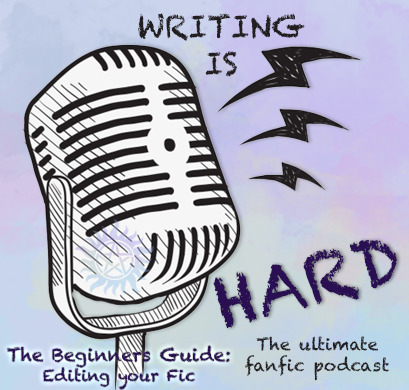
Listen to the episode here.
Summary: Bee and Mads talk about editing your fic and the difference between Alpha, Beta and Omega readers!
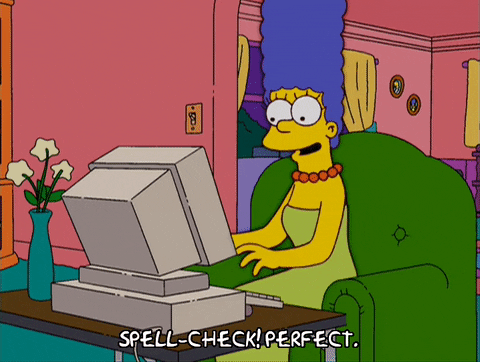
(gif credit)
Episodes Masterlist
A rundown of some of the points discussed is below the cut!
In this episode, Bee and Mads talk about the different types of editors out there in the fanfic world.
Alpha readers - There from conception of the idea through publication
Brainstorming
Continuity
Characterization
Challenging you to write better in all ways
Some will even help you find appropriate art or gifs for posting
Check out the Alpha Reader Program at the @spnfanficpond if you're interested in either becoming an alpha reader or working with one!
Beta Readers - Generally only brought in after the first draft is written
Proofreading for typos, grammar, and punctuation
[Note: Although spellcheckers are great, they do not catch if you replace one word with another valid word, such as replacing 'in' with 'inn'. Word, Grammarly, and other grammar-checking programs can help a lot, but also are not perfect!]
Can sometimes help with giving you overall impressions of the story, such as if a cliffhanger or plot twist works
The @spnfanficpond also has a list of beta readers for their members
You can also check their tag #betas make everything betta
Omega Readers - Only brought in after the beta readers and before publication
Used for feedback only, like a focus group
Should tell you if a plot twist or cliffhanger works since they don't know as much about the story as an alpha or beta reader
Do not make changes to the fic.
That's it for this episode! Give it a listen and let us know what you think!
53 notes
·
View notes